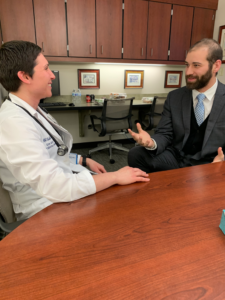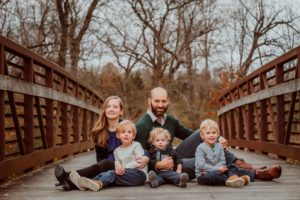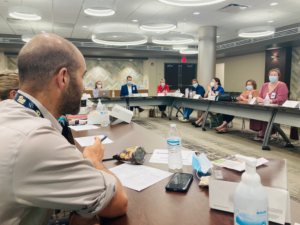A Philosopher Who Does Bioethics
By Trudi Galblum, Marketing, Communications, and Grant Writing
New careers often emerge from new technology. Clinical ethics is one of them. Clinical ethicists assist health professionals in identifying, analyzing and resolving ethical issues that arise in health and healthcare.
As a career path, however, clinical ethics is not well known, in part because it’s still relatively new. Ryan Pferdehirt didn’t know about it until he was in college, majoring in math and philosophy at the University of Pittsburgh in Pennsylvania.
“I realized that the novels I read in high school were tapping into something deeper,” said Ryan. “I could see that my favorite writers were actually philosophers first and writers second. Camus led me to reading Dostoevsky, Kierkegaard, Kant and on to the classics – Plato, Aristotle and Socrates.”
At first in philosophy, Ryan was drawn to epistemology, a subfield of philosophy that explores what is knowledge and what can we know. “I liked objective truths,” he said. “I thought ethics, which involves interactions between people, was too human.”
Out of the Ivory Tower
Two things happened during Ryan’s sophomore year that changed his thinking about ethics. First, he was fascinated by a medical ethics case presented in his logic class. Second, his girlfriend, now wife, Elizabeth pressed him to think about career options in philosophy.
“I remembered the medical ethics case and started looking into it,” he said, “and the more I read about it, the more I fell in love with it.”
Up to that point, he explained, he had experienced philosophy in the so-called ivory tower. You study what someone said about reality and apply it to what someone else said. Medical ethics showed him a way to apply philosophical principles and reasoning to solving real world problems.
“Medical ethics is a logical system that takes into account what everyone involved – patient, family, clinicians and

the provider – is looking to achieve, what is medically possible, and what are the alternatives if something is not medically possible,” he said.
“As a medical ethicist, it’s my job to balance all of those thoughtfully with compassion and make a recommendation.”
Ethics from the Ground Up
From sophomore year on, Ryan laser-focused on medical ethics. While studying for his master’s degree in medical ethics at Creighton University in Omaha, Nebraska, he supported himself on full-time jobs in healthcare-related fields, primarily at the University of Pittsburgh Medical Center, while also volunteering for a physician conducting medical ethics research.
In search of a full-time job in bioethics upon completing his master’s degree and thesis on advance directives, he learned that MultiCare Health System in Tacoma, Washington, was looking to hire a clinical ethicist.
By the time he accepted the position, the job description involved building an ethics department and integrating ethics into everyday patient care from the ground up for all 11 hospitals in the system. He also was responsible for a new project to promote advance directives.
When he left MultiCare three years later to join the Center for Practical Bioethics, the system was doing 120 ethics consults a year, had integrated clinical ethics in policy and standard patient interactions, started a new pediatric ethics committee for the system’s children’s hospital, and started a joint-venture internship with the local university.
Wrenching Decisions
Ryan believes studying bioethics and practicing clinical ethics require two different skill sets, of which he excels in the latter.
“Bioethicists,” he said, “are thought leaders. They work on policy development and promoting what is ethical care in the world. Say you have a patient 23 weeks pregnant and hemorrhaging. Delivery is inevitable.
“A bioethicist will ask what medical interventions are possible and about the moral distress of the staff. The clinical ethicist will carefully review risks, benefits, possible outcomes and interests of everyone involved – mother, father, clinicians and the hospital’s resources – and then make a recommendation based on analyzing all the factors.
“These are gut wrenching decisions on subjects not many people want to talk about,” he continued. “My strength lies in using natural and logical approaches to parse out complex issues, separating the ethical questions from all other factors, including emotional factors that often cloud our abilities when we are facing a family health crisis.
“I feel called to help people in emotionally challenging situations because all of my life and education have been training me to be good in this field.”
A Day in the Life

In June 2019, with an offer to join the staff of the Center for Practical Bioethics as the Director of Membership and Ethics and Education, the Pferdehirts moved to Kansas City, where Elizabeth has extended family.
“We wanted to live where we could drive to see family,” said Ryan, now the father of four children under the age of six.
At the Center, Ryan oversees the development and growth of ethics competencies for 26 hospitals and health systems. A typical day for him includes working with ethics committees, training hospital staff and volunteers, researching and writing policies, serving on committees involved in protecting patients who are involved in experimental research, and responding to calls to consult on cases like these:
The patient has a progressive neurological disorder and cognitive impairment. He grew up in foster care, had very little education, avoided medical care most of his life, and is unable to speak for himself. The default in this situation is to “do everything,” but the doctor recommends hospice. The hospital wants to make sure that they protect the patient in recommending comfort care only. Ryan is asked to determine whether doing so would be ethically appropriate.
The patient has incurable colon cancer that has spread to the liver and is receiving two infusions of blood daily. He is going to die. The ethical question is whether the infusions are a good use of a valuable treatment in severely short supply for a dying patient who cannot benefit from it long term, while possibly denying the treatment to someone who needs it immediately to survive.
Hot Topics
Ryan and his colleagues’ work at the Center includes developing resources for ethics committees, including monthly webinars and the Ethics Dispatch newsletter. Every issue of the Dispatch features a “hot topic” in bioethics.

Asked what he sees as the three top “hot topics” in clinical ethics today, Ryan cited the following:
- Futile care, that is, care with no benefit to the patient but wanted by the family.
- Financial obligations, where the cost of continuing to live motivates a patient to forego treatments that might extend their lives.
- Genetic medicine, also known as precision medicine, which involves creating treatments for individual genetic codes, accessible only to the wealthy and powerful.
And if he could change one thing about healthcare today?
“I would like to see patients and doctors trust each other more,” he said. “We are in a time of distrusting experts, and that’s detrimental to everybody involved. When what the patient wants to achieve and what the doctor thinks is possible intersect, it works really well.”
Written by Trudi Galblum, Marketing, Communications, and Grant Writing


